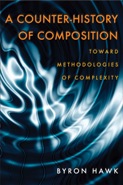A Counter-History of Composition: Toward Methodologies of Complexity
by Byron Hawk
U of Pittsburgh P, 2007, ISBN-10: 0-8229-5973-1
Reviewed by Wesley Venus, University of Georgia
| Summary | Discussion | Applicability | Pedagogy | Hopes/Desires | Conclusion(s) | Assessment | References | Notes |
| Hopes/Desires | ||
 |
Afterword: Toward a Counter-Historiography In his Afterword Hawk explains that his book is meant to offer a subversive historiography, to avoid “remythification.” Once more, it is meant, as the title infers, to function as a counter-historiography. In doing so, he would leave off with a few “conceptual starting places,” the first of which is in “[a]cknowledging that writing history is fundamentally rhetorical and responds to rhetorical situations” (p. 260). There he argues, as he notes Nietzsche does, for looking at the complexities of the present before theorizing the monuments of the past. Such an approach to history is a rhetorical one, he explains, as it does not valorize and decontextualize the past. Instead, it puts the past into a context where it is one of many parts in a complex ecology. He likewise notes that, characteristic of a counter-historiography, one excludes or negates nothing; instead, categories and terms get stretched, and questions stay open and unanswered (p. 262). Again, everything belongs, and new assemblages of concepts and possibilities for new thoughts are made available for new groupings and new categorizations. Way is made for a multiplicity of understandings and the possibility that a topic can be variously categorized, but not definitively so. Each approach to composition has a rhetorical situation implicit to it, and a counter-historiography embraces the notion that rhetoric is a resource that cannot be exhausted or fully contained.
|